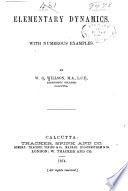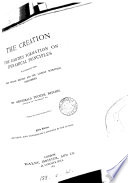 that every particle of matter in the universe attracts every other particle, with a force whose direction is that of the line joining the two, and whose magnitude is directly as the product of their masses, and inversely as the square of their distances... that every particle of matter in the universe attracts every other particle, with a force whose direction is that of the line joining the two, and whose magnitude is directly as the product of their masses, and inversely as the square of their distances...  History of Astronomy - Page 67by George Forbes - 1909 - 200 pagesFull view History of Astronomy - Page 67by George Forbes - 1909 - 200 pagesFull view - About this book
 | W. G. Willson - Dynamics - 1874 - 294 pages
...arrived at. The motion of a projectile in air is too difficult a problem to be discussed here. 84. LAW OF GRAVITATION. — Every particle of matter in the universe attracts every other particle with a force, in the direction of the line joining the two, whose magnitude is directly proportional to the product... | |
 | William Stanley Jevons - Logic - 1874 - 984 pages
...exactly true ; but we cannot calculate out in any one case its accurate results. The law asserts that every particle of matter in the universe attracts every other particle, with a force depending on the masses of the particles and their distance. We cannot then know the force acting on... | |
 | James Nasmyth, James Carpenter - Lunar craters - 1874 - 308 pages
...solve the problem we have to appeal to Newton's law of universal gravitation. This law teaches us that every particle of matter in the universe attracts every other particle with a force which is directly proportional to the mass, and inversely proportional to the square of the * distance... | |
 | Archibald Tucker Ritchie - 1874 - 690 pages
...Newton's law of gravitation, says — * Gen. j. 2. f Presbyterian Review on Mr. Fairholuie's Geology. "Every particle of matter in the universe attracts every other particle with a force directly proportioned to the mass of the attracting particle, and inversely to the square of the distance... | |
 | Joel Dorman Steele - Astronomy - 1874 - 424 pages
...holds them with an irresistible .power in their appointed paths. At last he announced this grand Law of Gravitation : EVERY PARTICLE OF MATTER IN THE UNIVERSE ATTRACTS EVERY OTHER PARTICLE OF MATTER WITH A FORCE DIRECTLY PROPORTIONAL TO ITS QUANTITY OP MATTER, AND DECREASING AS THE SQUARE... | |
 | John Nelson Stockwell - Lunar theory - 1875 - 74 pages
...subjected to calculation by NEWTON. The theory when regarded as a law of nature may be stated as follows : Every particle of matter in the universe attracts every other particle with a force which varies directly as its mass, and inversely as the square of the distance between them. Mathematicians... | |
 | B. F. Cocker - Theism - 1875 - 436 pages
...millions of miles off, in preference to moving in any other direction, the answer given is that, " Every particle of matter in the universe attracts every other particle with a force whose direction is that of the line joining the two, and whose magnitude is directly as the product... | |
 | John Tyndall - Science - 1876 - 706 pages
...this whole pomp of stars might have been evolved. The law of gravitation enunciated by Newton is, that every particle of matter in the universe attracts every other particle with a force which diminishes as the square of the distance increases. Thus the sun and the earth mutually pull... | |
 | John Tyndall - Science - 1876 - 656 pages
...this whole pomp of stars might have been evolved. The law of gravitation enunciated by Newton is, that every particle of matter in the universe attracts every other particle with a force which diminishes as the square of the distance increases. Thus the sun and the earth mutually pull... | |
 | Alexander Mackay - Geomorphology - 1877 - 184 pages
...universal space. It was Newton that first gave clear expression to the law of gravitation in these words : "Every particle of matter in the universe attracts every other particle with a force directly proportional to the mass of the attracting particle, and inversely as the square of the distance... | |
| |